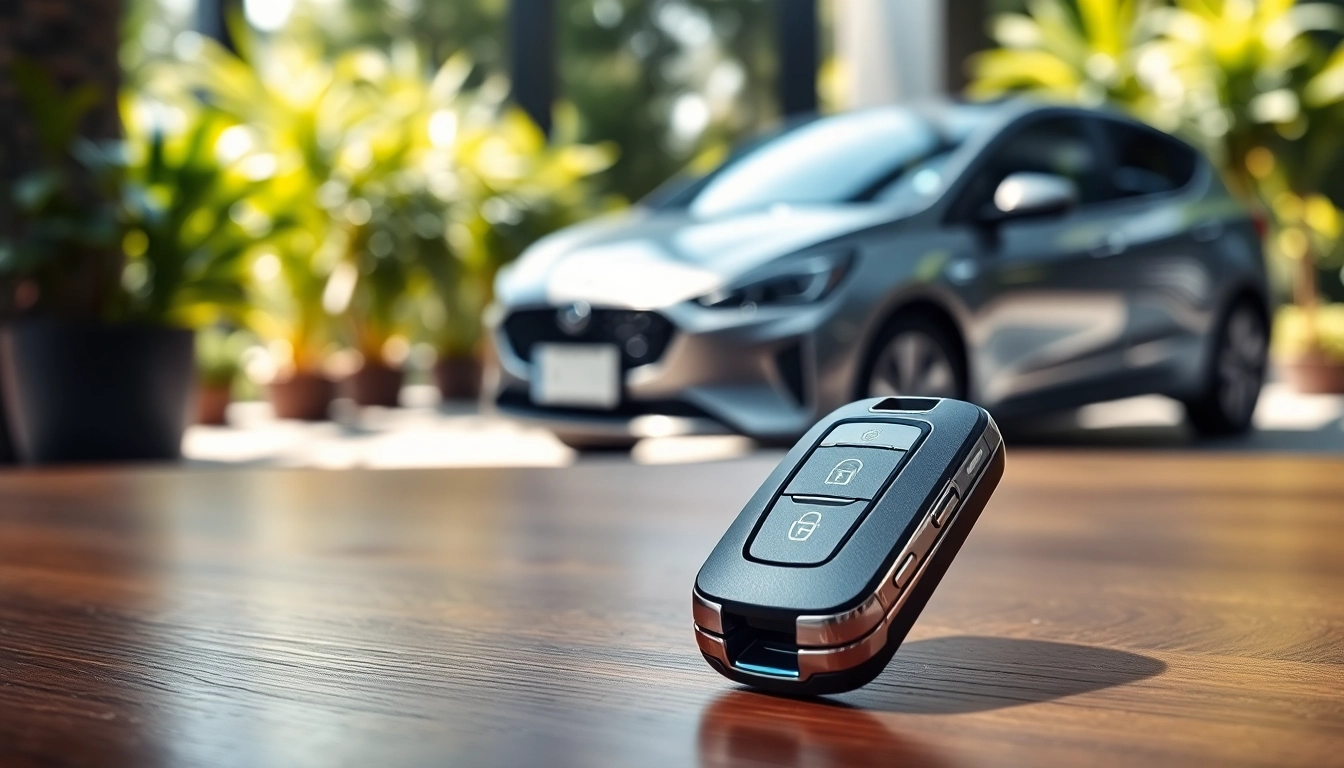Introduction to Keys for Electric Cars
The rapid evolution of electric vehicles (EVs) has brought significant changes not just in the vehicles themselves but also in their access technologies. Gone are the days of simple mechanical keys; today’s EVs employ sophisticated systems that enhance security, convenience, and connectivity. Keys for electric cars represent a blend of technology and innovation, wide-ranging from traditional key fobs to mobile applications serving as digital keys.
Overview of Key Types Used in EVs
Electric vehicles utilize a variety of key types, reflecting the diverse technological advancements witnessed in the automotive sector. These range from classic key fobs to modern mobile app integrations, which allow drivers to unlock, start, and manage their vehicles directly from their smartphones. In recent years, the emergence of digital keys has signaled a shift towards more secure and convenient methods of vehicle access.
Evolution from Traditional to Electric Car Keys
The transition from traditional car keys to electric car keys maps a fascinating technological journey. Initially, car keys were purely mechanical, offering limited functionality. As vehicles transformed into more complex machines, so too did their access methods. The introduction of key fobs brought remote unlocking and ignition capabilities while maintaining an element of physical security. This evolution has culminated in the development of digital keys which eliminate the need for physical keys altogether.
Importance of Secure Key Systems in EVs
Security is paramount in the design and implementation of keys for electric cars. With increased technological sophistication comes the risk of cyber threats. The importance of secure key systems cannot be overstated, as they protect not only the vehicle itself but also the sensitive data that modern cars can collect and transmit. Many EV manufacturers now incorporate advanced protocols, such as encryption and authentication layers, to safeguard against unauthorized access.
Types of Keys for Electric Cars
Key Fobs: The Traditional Choice
Key fobs remain a prevalent choice among electric vehicle owners, combining convenience with functionality. Unlike traditional keys, key fobs often include additional features, such as remote start, trunk release, and vehicle locator functions. Their ability to streamline the entry and operation of the vehicle makes them an appealing choice for many drivers. However, the limitations of key fobs include battery dependency and potential vulnerability to signal interception.
Mobile App Integration as Keys
Mobile apps represent a revolutionary shift in how drivers interact with their EVs. Many manufacturers now offer mobile applications that function as keys, allowing users to lock, unlock, start, and even monitor their vehicle status from anywhere. This remote capability offers unparalleled convenience, as it does not require physical access to a key fob. Additionally, app-based systems often integrate with other smart technologies, providing a seamless user experience.
Digital Keys: The Future of Access
Digital keys are heralded as the future of vehicle access. These keys often operate via Near Field Communication (NFC) or Bluetooth technology, allowing users to unlock and start their vehicle by simply being in proximity. Digital keys eliminate the need for physical interaction with the car, creating a touchless experience that is particularly appealing in today’s health-conscious world. Furthermore, the ability to share digital keys with others via a smartphone adds a new dimension of convenience and flexibility.
Benefits of Electric Car Keys
Convenience and Accessibility Features
The primary advantage of modern keys for electric cars is convenience. With features like keyless entry, remote start, and smartphone integration, drivers enjoy faster access and seamless vehicle operation. Key fobs and mobile apps also allow for easy sharing among family or friends, further enhancing accessibility. Advanced systems can even offer features such as geofencing, alerting owners if a vehicle moves outside a designated area.
Enhanced Security Protocols
As cyber threats become more sophisticated, so do the security protocols associated with electric vehicle keys. Many digital keys now employ multi-factor authentication and encrypted communication standards, making unauthorized access significantly more difficult. Users can also typically manage their key access through mobile applications, enabling real-time oversight and control of who can access a vehicle and under what conditions.
Eco-friendliness of Digital Key Solutions
Digital key solutions align closely with the eco-friendly ethos of electric vehicles. By reducing the need for physical keys and the accompanying materials, manufacturers can minimize their environmental footprint. Furthermore, digital keys often facilitate the optimally efficient use of shared vehicle resources, which can incentivize carpooling or ride-sharing models.
How to Use Keys for Electric Cars Effectively
Best Practices for Key Fob Maintenance
To ensure the longevity and reliability of your key fob, consider adopting several best practices for maintenance. Regularly replace the battery as needed, and keep the fob clean and dry. Avoid exposing key fobs to extreme temperatures or direct sunlight for extended periods, as these conditions can degrade their functionality. If the fob is getting worn, it may be worthwhile to invest in a protective case.
Troubleshooting Common Key Issues
Key fobs may experience various issues over time, from dead batteries to programming errors. If your key fob becomes unresponsive, first try replacing the battery. If the problem persists, consult your vehicle’s manual for specific troubleshooting steps. In some cases, reprogramming may be necessary, which can often be performed by your vehicle manufacturer or a certified technician.
Key Programming and Replacement Process
Programming and replacing electric vehicle keys involve various steps, often unique to each car model. For those who find that their key fob is lost or damaged, replacement parts may be available through authorized suppliers. The replacement process typically requires professional assistance to ensure compatibility and proper programming of the new key. Always consult your vehicle’s manual for guidelines on the specific process to follow.
Future Trends in Keys for Electric Cars
Advances in Keyless Entry Technology
Keyless entry technology continues to evolve, with developments aimed at improving both security and user experience. Future innovations may include gesture-based key systems, where drivers can unlock or start their vehicle with a simple hand movement. Such technology would not only enhance user convenience but also align with trends toward automation and touchless interactions in various sectors.
Integration with Smart Home Systems
The integration of electric vehicle keys with smart home systems presents exciting possibilities. Home automation systems may allow drivers to set their home environment in concert with their vehicle status, such as adjusting lighting and temperature upon arrival. This kind of interoperability increases overall functionality and provides a seamless experience between home and vehicle life.
The Role of Blockchain in EV Security
Blockchain technology represents a promising frontier in enhancing vehicle security. By utilizing decentralized ledgers, manufacturers could create immutable records of key access protocols, making it virtually impossible for unauthorized users to replicate keys. This approach could bolster the overall security of electric vehicles, enhancing consumer confidence in digital key solutions.



